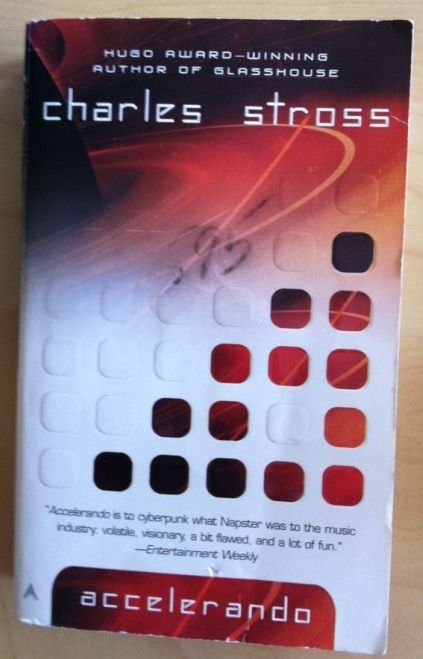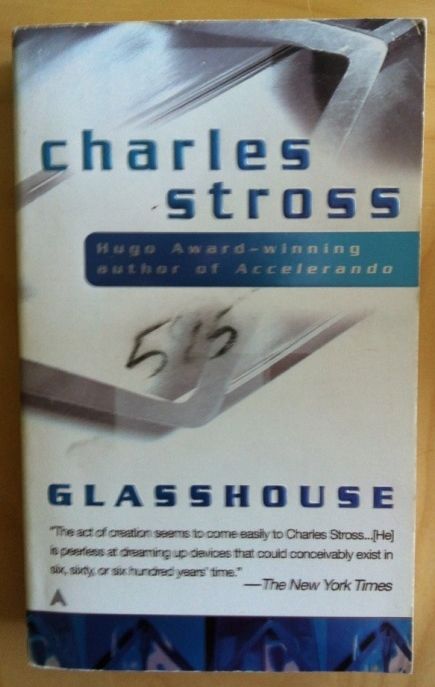Or why you should read Accelerando and Glasshouse by Charles Stross
Accelerando is the story of the yawning Singularity, that epoch when all of humanity's thinking creations become exponentially smarter than their makers. When software agents become like gods, in a very imprecise nutshell. The story follows the exploits of a single family over three generations and a couple hundred years of human/computer coevolution: from futurist socialist iconoclast Manfred Macx and his IRS agent, dominatrix wife Pamela to their daughter Amber Macx, space exploring royalty, to her son Siran al-Khurasani, a socially inept academic living in a post-human enclave on Saturn. It's a book of mad ideas and brain blisteringly smart concepts. I don't think it is any exaggeration to call Accelerando a modern classic of Science Fiction.
I don't think I can overemphasize how smart this novel is either. The idea density in Accelerando is staggering: virtually every sentence of prose hints at a dozen other ideas, each worthy of their own consideration. And of course these hyper-dense ideas are delivered with a frenetic pace that just increases as the novel progresses. And so we never catch up, staggering about stupidly, overwhelmed by the sheer mass of ideas, and the thoughts those ideas spawn. The result is pure future shock. Which of course works brilliantly with the themes being discussed. Because, in the future, humanity as we know it, is obsolete.
I can whole heartedly recommend this book to anyone. It's a brilliant representation of what good contemporary Science Fiction can be: wickedly smart, mature in its treatment of big concepts, but still with a sense of mad fun. Also, you can legally give Accelerando a try for free from the author's website.
Glasshouse is in a lot of ways the opposite of Accelerando despite being a semi-sequel. Instead of showing us a few hundreds years of contemporary humans flung into a barely comprehendible future dictated by software agents beyond our meat-brained understanding, Glasshouse takes post-humans eking out a comfortable living on the fringes of the singularity and hurls them back in time to a simulation of 20th century living. In the novel, Robin, an amnesiac man who has undergone selective memory surgery to forget his shadowy and violent past, is forced by the threat of assassination to volunteer for an experiment to recreate 20th century life. But the experiment isn't what he expected, and he finds himself trapped with the very people he was trying to escape.
Glasshouse is another aggressively smart book. It portrays a post-singularity society with its awesome technology, radically different social norms, and with the particularly unsettling aspects of perfectly mutable human software. Glasshouse is even better in its portrayal of 20th century living. In the design of its experiment we see, from the future perspective of Robin, just how dysfunctional the 20th and 21st century are. Glasshouse very much holds up a mirror that reveals just how arbitrary and draconian our modern gender politics, economics, and social standards are. It's disquieting and completely relentless and tied to a properly tense mystery/thriller plot.
On the whole I'd recommend Glasshouse. It's wickedly smart, high concept Sci-fi that plays with some pretty important themes while still being eminently readable. It was the first Stross novel I ever tried, and I enjoyed it enough to dive head first into his bibliography. That said, Glasshouse does have it's faults: one of it's "mystery reveals"is pretty obvious (although less out of authorial negligence and more because the narrative demanded it, although still requiring characters to have a paradoxically 20th century attitude) and the discussion of feminist theory is "very 101" according to a friend I lent the book to. So your mileage may vary. But I really enjoyed this book, and if you like high concept Sci-fi, I suspect you will enjoy it too.
(To be fair, criticizing a "mainstream" novel for being too simple in its portrayal of feminism is, I think, unfair. I have NEVER taken a feminist course during either of my Science degrees, and I suspect this experience is true for a lot of non-Humanities students... and probably most straight male students in general. As a result, I think there is value in placing these basic ideas where we uneducated slobs can encounter them and learn the basics. It's part of why I like Glasshouse and why The Handmaids Tale is an ESSENTIAL piece of literature.)


No comments:
Post a Comment